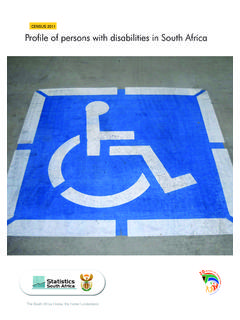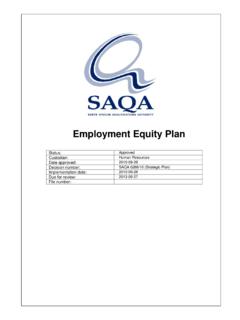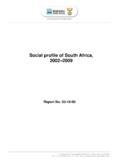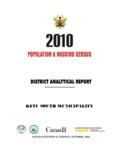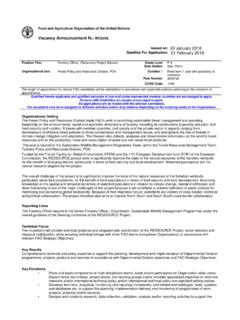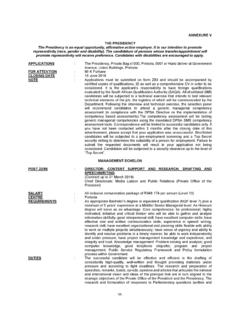Transcription of CONSTITUTIONAL COURT OF SOUTH AFRICA Case …
1 CONSTITUTIONAL COURT OF SOUTH AFRICA Case CCT 78/15 In the matter between: SOLIDARITY First Applicant P J DAVIDS Second Applicant C F FEBRUARY Third Applicant A J JONKERS Fourth Applicant L J FORTUIN Fifth Applicant G M BAARTMAN Sixth Applicant D S MERKEUR Seventh Applicant T S ABRAHAMS Eighth Applicant D R JORDAN Ninth Applicant J J KOTZE Tenth Applicant D M A WEHR Eleventh Applicant and DEPARTMENT OF CORRECTIONAL SERVICES First Respondent MINISTER OF CORRECTIONAL SERVICES Second Respondent NATIONAL COMMISSIONER, DEPARTMENT OF CORRECTIONAL SERVICES Third Respondent MINISTER OF LABOUR Fourth Respondent POLICE AND PRISONS CIVIL RIGHTS UNION First Amicus Curiae SOUTH AFRICAN POLICE SERVICE Second Amicus Curiae Neutral citation: Solidarity v Department of Correctional Services [2016] ZACC 18 Coram: Moseneke DCJ, Cameron J, Jafta J, Khampepe J, Nkabinde J, Nugent AJ, Van der Westhuizen J and Zondo J Judgments: Zondo J (majority): [1] to [95] Nugent AJ (minority): [96] to [134] Heard on: 18 November 2015 Decided on: 15 July 2016 Summary.
2 Validity of employment equity plan non-compliance with section 42 of Employment Equity Act failure to take into account demographic profile of both regional and national economically active population in setting numerical targets and assessing representivity Barnard principle Also applies to African, Coloured and Indian candidates as well as to men, women and people with disabilities employee may be denied appointment if he or she belongs to a category of persons that is already adequately represented at relevant occupational level wrong benchmark used to set targets and determine representation Plan not declared invalid refused to appoint candidates unfair discrimination based on race or gender numerical targets not quotas refusal to appoint set aside and appropriate relief granted ORDER On appeal from the Labour Appeal COURT : 1.
3 The late delivery of the first to third respondents written submissions is condoned. 2. Leave to appeal is granted. 3. Subject to paragraph 4, the appeal is upheld. 4. The appeals by Mr PJ Davids, Mr AJ Jonkers and Ms LJ Fortuin are dismissed. 5. The orders of the Labour COURT and Labour Appeal COURT are set aside and that of the Labour COURT is replaced with the following: (a) The claims by Mr PJ Davids, Mr AJ Jonkers and Ms LJ Fortuin are dismissed. (b) The decisions of the Department of Correctional Services not to appoint the rest of the individual applicants to the posts in which they respectively sought to be appointed constituted unfair discrimination and unfair labour practices and are set aside. (c) Those individual applicants who had applied for appointment to posts that remain vacant to this day or that are presently vacant even if they had subsequently been filled must be appointed to those posts and be paid remuneration and accorded the benefits attached to those respective posts.
4 (d) Those individual applicants who had applied for appointment to posts that were subsequently filled and are presently filled must be paid the remuneration and be accorded the benefits attached to those respective posts. (e) The orders in (c) and (d) shall operate with retrospective effect from the date with effect from which the individual applicants would have been appointed to the respective posts had they not been denied appointment. (f) There is no order as to costs. 6. There is no order as to costs in this COURT . 4 JUDGMENT ZONDO J (Moseneke DCJ, Jafta J, Khampepe J, Nkabinde J and Van der Westhuizen J concurring) Introduction [1] The applicants have brought an application for leave to appeal against a decision of the Labour Appeal COURT (LAC).1 In terms of that decision the applicants appeal against a decision of the Labour COURT was dismissed.
5 The decision of the Labour COURT related to a dispute between the parties on whether the Employment Equity Plan2 of the first respondent, the Department of Correctional Services (Department), for the period 2010-2014 (2010 EE Plan) was invalid. In addition, the Department s refusal to appoint the second and further applicants to certain posts constituted unfair discrimination and unfair labour practices and, if so, what the appropriate remedy was, was in issue. The Labour COURT had concluded that the 2010 EE Plan did not comply with certain provisions of the Employment Equity Act3 (EE Act) but had not declared the 2010 EE Plan invalid. It had also concluded that the Department s decisions not to appoint certain of the individual applicants constituted unfair discrimination but did not grant the individual applicants any individual relief.
6 Parties [2] The first applicant is Solidarity, a registered trade union. Some of its members are employed by the Department. The second to the eleventh applicants are employees of the Department. They are also members of Solidarity. Except for the 1 Solidarity and Others v Department of Correctional Services and Others [2015] ZALAC 6; 2015 (4) SA 277. 2 As to what an employment equity plan is, see section 20 of the Employment Equity Act 55 of 1998. Section 20 is quoted in [69] of this judgment. 3 55 of 1998. ZONDO J 5 second applicant who is a White person, the individual applicants are Coloured people. Some of the individual applicants are men whereas others are women. The individual applicants are all based in the Western Cape. [3] The first respondent is the Department. The second respondent is the Minister of Correctional Services.
7 The third respondent is the National Commissioner of the Department of Correctional Services (National Commissioner). The fourth respondent is the Minster of Labour. She is the Minister responsible for the administration of the EE Act. The Police and Prisons Civil Rights Union, a registered trade union, was admitted as the first amicus curiae (friend of the COURT ). Some of the employees in the Department are members of this trade union. The SOUTH African Police Service was admitted as the second amicus curiae. We are very grateful to the two amici for the contribution they made to the debate. Background [4] An employment equity plan is a plan provided for in section 20(1) of the EE Act which an employer prepares, adopts and implements in order to achieve employment equity in its workforce. The first employment equity plan of the Department was for the period 2000-2004.
8 The second was for the period 2006-2009. In 2010 the Department adopted its 2010 EE Plan. That Plan was adopted after extensive consultations with a number of stakeholders including recognised trade unions. It would appear that most of the recognised trade unions accepted the 2010 EE Plan. Solidarity was not one of the recognised trade unions in the Department. [5] The 2010 EE Plan set certain numerical targets to be attained within the five year period of the plan in order to achieve employment equity in the Department s workforce. The numerical targets set in the 2010 EE Plan were: for White males and females; for African males and females; ZONDO J 6 for Coloured males and females; for Indian males and females. The numerical targets in the 2010 EE Plan were based on the mid-year population estimates, 2005, issued by Statistics SOUTH AFRICA .
9 [6] In 2011 the Department advertised certain posts in the Western Cape. The individual applicants applied for appointment to some of the posts. Except for Mr AJ Jonkers who was not recommended, all the other individual applicants were recommended for appointment by the respective interview panels. Except for Ms LJ Fortuin who was subsequently appointed to the position for which she had applied, the individual applicants were denied appointment. In the case of males, the basis for this decision was that they were Coloured persons and Coloured persons were already overrepresented in the relevant occupational levels. In the case of women, the basis was that women were already overrepresented in the relevant occupational levels. This meant that appointing the individual applicants to the positions for which they had applied would not be in accordance with the 2010 EE Plan.
10 [7] The 2010 EE Plan made provision for the National Commissioner to deviate from the targets in the 2010 EE Plan in certain circumstances. A deviation meant that the National Commissioner could approve the appointment of a candidate from a non-designated group in certain circumstances despite the fact that the appointment of a candidate from a designated group should be preferred as it would advance the targets of the 2010 EE Plan. This would occur where a candidate has special skills or where operational requirements of the Department dictated that that candidate be appointed. In this case no deviation was authorised. The effect of the provisions relating to the deviations is that they enabled the Department not to make appointments that advanced the numerical targets in certain circumstances. In other words, although the appointment of candidates that advanced the pursuit of the numerical targets of the 2010 EE Plan, and, therefore, the achievement of equitable ZONDO J 7 representation, was the preferred route, exceptions to that approach were provided for.










